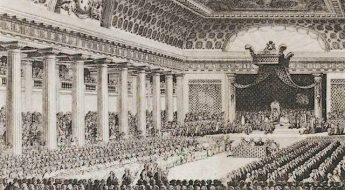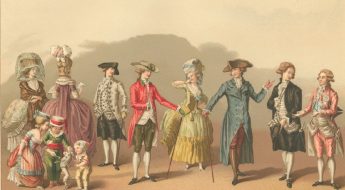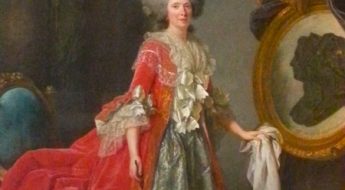Mme de Boigne (1781-1866), née Adèle d’Osmond, was a French salon hostess and writer. She was born in the Château de Versailles and lived at the court of Louis XVI and Marie-Antoinette until her family fled to England during the Revolution. Later in her long life, she married a rich soldier of fortune 30 years her senior, hosted a brilliant salon in Paris, and became an intimate of the last French queen, Marie-Amélie, consort of King Louis Philippe (r. 1830-1848). Childless herself, Mme de Boigne addressed her memoirs to her nephew. The memoirs were not published until 1907, under the title Récits d’une tante, or An Aunt’s Tales. They’ve never been published in English, as far as I know, so I’ve decided to translate the first 5 chapters, the ones that take place mainly at Versailles, and post them here on this blog for interested readers to enjoy for free.
The chapters are quite lengthy, so I’ve broken each one into several parts. In Part 1.2 (see below), Mme de Boigne introduces the Dillons, her mother’s Irish family, and narrates the story of her parents’ difficult road to the altar. Her mother, though beautiful and kind, had hardly a penny, you see…
A CHILDHOOD AT VERSAILLES, PART 1.2
I must now speak of my mother’s family. Mr. Robert Dillon, of the Dillons of Roscommon, was an Irish Catholic gentleman possessed of a pretty fortune. To augment it, given the state of Catholic disability, he entrusted it to one of his brothers to turn it to account in trade. Mr. Dillon had married a rich heiress by whom he had an only daughter, Lady Swinburne. Becoming widowed, he married Miss Dicconson, the youngest of three sisters, all beautiful as angels, whom their father, the governor of the Prince of Wales, had raised at Saint-Germain. At the time of the wedding the parents had returned to England and established themselves at their home in Lancashire, a very beautiful estate.
Mr. Dillon and his charming wife settled in Worcestershire, and it was there that my mother and her six older siblings were born. However, the brother in charge of the business affairs in Ireland died, and it became apparent that he had managed them badly. Mr. Dillon was obliged to take charge of them himself. The most important trade was with Bordeaux, and he decided to go there and take his family with him. He liked it there, and his wife, who had been raised in France, preferred it to England. He took a beautiful house in Bordeaux, bought a small estate called Terrefort nearby, and was living the life of a rich man when, rising from table one day, he clapped his hand to his head, cried, “Oh, my poor wife! My poor children!” and expired.
His exclamation was quite justified. He left Mme Dillon, aged thirty-two and pregnant with her thirteenth child, in a foreign land without a single relative or close connection, which the excessive jealousy of her husband would scarcely have tolerated. This very isolation aroused interest and inspired protectors to step forward. Her affairs, of which she had no notion, were looked into. The upshot, as was discovered, was that Mr. Dillon had been living off capital that was about run out. She was left with thirteen children and nothing to live on but a small property three leagues from Bordeaux that might produce four thousand a year in revenue.
Mme Dillon was still quite lovely, very kind and very virtuous. Her children were also of a striking beauty. This lovely, abandoned brood attracted interest and solicitude. Everyone wanted to fly to their aid. Such numbers did, in fact, that without ever leaving her little turrets at Terrefort, my grandmother kept up our family name and somehow unlocked the secret to raising thirteen children and establishing them in positions that promised a brilliant future. Then the Revolution brought all their careers to a halt. At the time of which I am speaking, only my mother remained to be married off. She was beautiful and kind, but she had not a penny to her name.
My father’s wedding having been fixed for the spring, the Bishop set off for Paris. He had scarcely arrived there, where he was no longer under the enchantress’s spell, when he was easily made to see that this match made no sense, not even common sense, and that my father should profit from his name and position in society to marry for money. He had no fortune in Europe; the one in the colonies was precarious, and inheritance being equal there, he would never have enough income to marry a woman who had none. The Bishop, receiving the young people at his home, only gave them a temporary respite. Mlle Dillon might well be a very presentable young lady, but she would never make a fit match. Comte d’Osmond, above all, being very proud of his nephew and thinking him destined for great things, was very much against what he called his nephew “putting a noose around his neck.”
The Bishop was easily converted to this way of looking at things. While this was going on, a response arrived from Saint-Domingue. It was entirely in favour of the marriage. My father, who had no inkling of what had been happening, arrived at his garrison to receive his uncle’s last orders before going to Bordeaux. He learned that the Bishop had changed his mind and no longer wanted to hear anything about this marriage. He had already stopped writing to Terrefort. There was a very lively scene between my father and the Bishop, who told him that the young couple should no longer expect to find shelter under his roof.
My father informed his father of the Bishop’s change of heart, and wrote to Mlle Dillon to explain the situation in which they now found themselves. She took it on herself to break off all contact, released him from his pledge, withdrew her own, and then took to pining and wanting to die like a veritable heroine in a novel. My father had been a little hurt by this this decision, against which he hardly dared to protest since the advantages he had to offer were much diminished by the Bishop’s ill humour. However, having learned by chance of Mlle Dillon’s state of despair, and that she was believed to be dying, he acknowledged the nobility of the sentiments that had guided her conduct. He received his father’s response, which was as tender as he could have desired: his father confirmed his approval, told him to go ahead with the marriage since his happiness depended on it, and promised to provide for the couple’s needs, even if he had to make the greatest sacrifices. He announced that he was sending barrels of sugar valued at twenty thousand francs to cover the initial costs of setting up their household.
Armed with this letter, my father disregarded all his orders and rode hell for leather straight to Mlle Dillon. Eight days later she was his wife.
As soon as she was fully recovered, he brought her to Paris. The Bishop still refused to see them. Comte d’Osmond, who had raised the loudest objections to this marriage at the time that it happened, did nothing other than busy himself with diminishing its ill consequences. He presented my mother at the Palais-Royal, as he would have done for his daughter-in-law, and she was well-received there. Mme de Montesson took a shine to her and supposedly wanted to attach her to Mme la duchesse de Chartres,4 but the Comte d’Osmond respectfully declined on her behalf. It did not seem right to him that his nephew’s wife should be the lady-in-waiting of a princess who was not a member of the royal family. In any case, he saw that Mme de Montesson wanted to ensnare him and he did not want to get in the habit of obliging her.
The Archbishop of Narbonne (Dillon) had been a little shocked at the objections made by the Osmonds to a marriage with a girl who bore his name, and whom he considered a near relation. He set himself up as the active protector of the newlyweds, drawing them to his country place, an estate in Picardie named Hautefontaine, where he led a life that was conspicuously more amusing than episcopal. My mother had great success there; she was extremely beautiful, she had a grand manner, which was even a little disdainful, and knew perfectly how to let herself be adored. She reported all the adoration to my father, the object of a passion that would last throughout her life until the grave. The arrival of this beautiful person, with all the romantic aura around her marriage, was a small sensation at Court at a time when there were hardly any big ones. She was presented by Mme de Fleury, who, like Mlle de Montmorency, was related to my father, and by Mme Dillon, the Archbishop’s niece. She was admired a great deal.
A few months later, by the joint influence of the Archbishop of Narbonne and the Comte d’Osmond, my mother was named lady-in-waiting to Madame Adélaïde, a daughter of Louis XV. Mme la duchesse de Chartres held no grudge against Comte d’Osmond for this appointment, but Mme de Montesson considered herself offended by it, and remained on bad terms with my parents, and above all with Comte d’Osmond, whose intimacy with Madame la duchesse de Chartres only increased. This was an entirely paternal sentiment that no one ever commented on, though M le duc de Chartres jokingly called him “my wife’s husband.” He died at the beginning of the Revolution, unfortunately for this princess, whom he would probably have saved from a number of errors and misfortunes. I remember him as a thin, tall man with a very noble bearing, wearing rich garments covered with tobacco dust. I loved him a great deal although he preferred my brother to me, and he always filled my eyes with tobacco dust when he bent down to kiss me. I took care to close them as I ran towards him, which amused him greatly.
My father was very reluctant to take up residence at Court. Like most people who were not accustomed to it, he felt like a fish out of water there and altogether at a disadvantage. He was then an agreeable and well-mannered man, remarkably kind, a very good soldier who enjoyed his profession and was adored in his regiment. My mother had a taste for princes and a courtier’s instincts. Her position forced her to spend one week in every three at Versailles. This separation from my father was very trying for both of them, and the modesty of their fortune made this duplicate household onerous.
My mother convinced my father to move to Versailles altogether. This was reasonable in their position, but unusual for people who did not hold great offices. My father often told me that nothing in his life had cost him more, and that it was the greatest sacrifice he had made for my mother. His tastes, his habits, his rationality, and his independent character were certainly inconsistent with the courtier’s profession. However, under Louis XVI, it was an easy profession to practice, except for certain forms of etiquette, and the gentleman in him so dominated the King that he very quickly came to appreciate those who had qualities similar to his own.
4. Louise de Penthièvre, wife of Philippe-Joseph-Égalité.
I present Mme de Boigne’s text without footnotes other than the ones that were included in the first edition of her memoirs. If you have any questions about any of the information, please comment. If you’ve enjoyed this passage, please share it! In Part 1.3, we’ll learn more about the Court.


















Leave a Comment